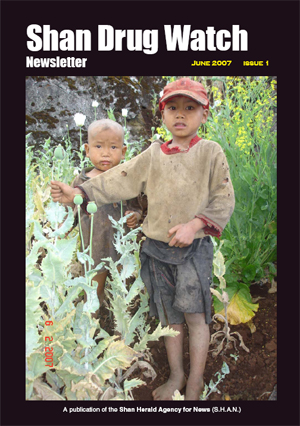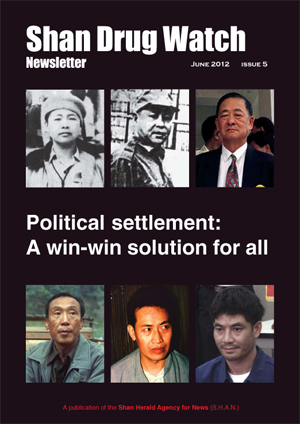Today, 26 June 2013, the International Day Against Drug Abuse and Illicit Trafficking, is quite special. SHAN has good news for so-called drug busters in our country: There isn’t a Shan Drug Watch report like previous years.
 There are several reasons why SHAN can’t publish one this year, but the main one is that it was cut off from funding from its donors.
There are several reasons why SHAN can’t publish one this year, but the main one is that it was cut off from funding from its donors.
No reason has been given for the termination, although the annual grant had never been more than $ 50,000 each year. Probably because SHAN wasn’t an exceptional case, because one of its partner organizations reported significant cut in funding too.
Whatever the reasons are, it has become increasing clear that drugs have become one of the country’s foremost problems during the last year, as evidenced by:
- Report to the National League for Democracy (NLD) Central Committee meeting last May
- Complaints voiced by the people at public consultations held by the Restoration Council of Shan State/ Shan State Army (RCSS/SSA) in several townships across Shan State
- Spontaneous actions against the scourge taken by the people in Muse, Namkham, Namtu and Tangyan
- Worsening situation after so-called “Mekong River drugload” Naw Kham was arrested and executed by Chinese authorities
- Druglords who are masquerading as lawmakers in the parliament
All these carry a similar message: Drugs have become such a threat the matter can no longer be left to governments to sort out.
Like the ongoing peace process, Naypyitaw and the non-Burman armed movements may want to resolve their problems without the participation (or interference, if you prefer) from the people.
 But looking at civil society organizations mushrooming up across the country, problems that have plagued it for so long – drugs, peace, federalism, poverty, land, etc. — will not go away until and unless the people are restored to their rightful place in the sun.
But looking at civil society organizations mushrooming up across the country, problems that have plagued it for so long – drugs, peace, federalism, poverty, land, etc. — will not go away until and unless the people are restored to their rightful place in the sun.


